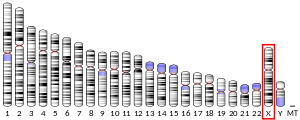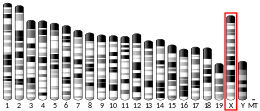Phosphorylase kinase, alpha 1
| PHKA1 | |||||||||||||||||||||||||
|---|---|---|---|---|---|---|---|---|---|---|---|---|---|---|---|---|---|---|---|---|---|---|---|---|---|
| Identifiers | |||||||||||||||||||||||||
| Aliases | PHKA1, PHKA, Phosphorylase kinase, alpha 1, phosphorylase kinase regulatory subunit alpha 1 | ||||||||||||||||||||||||
| External IDs | MGI: 97576 HomoloGene: 1981 GeneCards: PHKA1 | ||||||||||||||||||||||||
| |||||||||||||||||||||||||
| |||||||||||||||||||||||||
| |||||||||||||||||||||||||
| Orthologs | |||||||||||||||||||||||||
| Species | Human | Mouse | |||||||||||||||||||||||
| Entrez | |||||||||||||||||||||||||
| Ensembl | |||||||||||||||||||||||||
| UniProt | |||||||||||||||||||||||||
| RefSeq (mRNA) | |||||||||||||||||||||||||
| RefSeq (protein) | |||||||||||||||||||||||||
| Location (UCSC) | Chr X: 72.58 – 72.71 Mb | Chr X: 102.51 – 102.64 Mb | |||||||||||||||||||||||
| PubMed search | [3] | [4] | |||||||||||||||||||||||
| Wikidata | |||||||||||||||||||||||||
| |||||||||||||||||||||||||
Phosphorylase b kinase regulatory subunit alpha, skeletal muscle isoform is an enzyme that in humans is encoded by the PHKA1 gene.[5] It is the muscle isoform of Phosphorylase kinase (PhK).
The PHKA1 gene encodes the alpha subunit of muscle phosphorylase kinase (EC 2.7.1.38), a key regulatory enzyme of glycogen metabolism. Phosphorylase kinase consists of 4 copies of an alpha-beta-gamma-delta tetramer. The alpha, beta (PHKB; MIM 172490), and gamma (PHKG1; MIM 172470 and PHKG2; MIM 172471) subunits have several isoforms; the delta subunit is calmodulin (CALM1; MIM 114180). PHKA2 (MIM 306000) encodes the alpha subunit of liver-specific phosphorylase kinase and is also located on the X chromosome.[supplied by OMIM][5]
A deficiency of this enzyme causes glycogen storage disease type IXd (GSD 9D).
References
Further reading
- Brushia RJ, Walsh DA (1999). "Phosphorylase kinase: the complexity of its regulation is reflected in the complexity of its structure". Front. Biosci. 4: D618–41. doi:10.2741/Brushia. PMID 10487978.
- Daube H, Billich A, Mann K, Schramm HJ (1991). "Cleavage of phosphorylase kinase and calcium-free calmodulin by HIV-1 protease". Biochem. Biophys. Res. Commun. 178 (3): 892–8. doi:10.1016/0006-291X(91)90975-D. PMID 1872871.
- Meyer HE, Meyer GF, Dirks H, Heilmeyer LM (1990). "Localization of phosphoserine residues in the alpha subunit of rabbit skeletal muscle phosphorylase kinase". Eur. J. Biochem. 188 (2): 367–76. doi:10.1111/j.1432-1033.1990.tb15413.x. PMID 2108025.
- Francke U, Darras BT, Zander NF, Kilimann MW (1989). "Assignment of human genes for phosphorylase kinase subunits alpha (PHKA) to Xq12-q13 and beta (PHKB) to 16q12-q13". Am. J. Hum. Genet. 45 (2): 276–82. PMC 1683359. PMID 2757032.
- Wehner M, Clemens PR, Engel AG, Kilimann MW (1995). "Human muscle glycogenosis due to phosphorylase kinase deficiency associated with a nonsense mutation in the muscle isoform of the alpha subunit". Hum. Mol. Genet. 3 (11): 1983–7. doi:10.1093/hmg/3.11.1983. PMID 7874115.
- Wüllrich A, Hamacher C, Schneider A, Kilimann MW (1993). "The multiphosphorylation domain of the phosphorylase kinase alpha M and alpha L subunits is a hotspot of differential mRNA processing and of molecular evolution". J. Biol. Chem. 268 (31): 23208–14. PMID 8226841.
- Strausberg RL, Feingold EA, Grouse LH, et al. (2003). "Generation and initial analysis of more than 15,000 full-length human and mouse cDNA sequences". Proc. Natl. Acad. Sci. U.S.A. 99 (26): 16899–903. doi:10.1073/pnas.242603899. PMC 139241. PMID 12477932.
- Burwinkel B, Hu B, Schroers A, et al. (2004). "Muscle glycogenosis with low phosphorylase kinase activity: mutations in PHKA1, PHKG1 or six other candidate genes explain only a minority of cases". Eur. J. Hum. Genet. 11 (7): 516–26. doi:10.1038/sj.ejhg.5200996. PMID 12825073.
- Pallen MJ (2004). "Glucoamylase-like domains in the alpha- and beta-subunits of phosphorylase kinase". Protein Sci. 12 (8): 1804–7. doi:10.1110/ps.0371103. PMC 2323967. PMID 12876330.
- Gerhard DS, Wagner L, Feingold EA, et al. (2004). "The status, quality, and expansion of the NIH full-length cDNA project: the Mammalian Gene Collection (MGC)". Genome Res. 14 (10B): 2121–7. doi:10.1101/gr.2596504. PMC 528928. PMID 15489334.
External links



